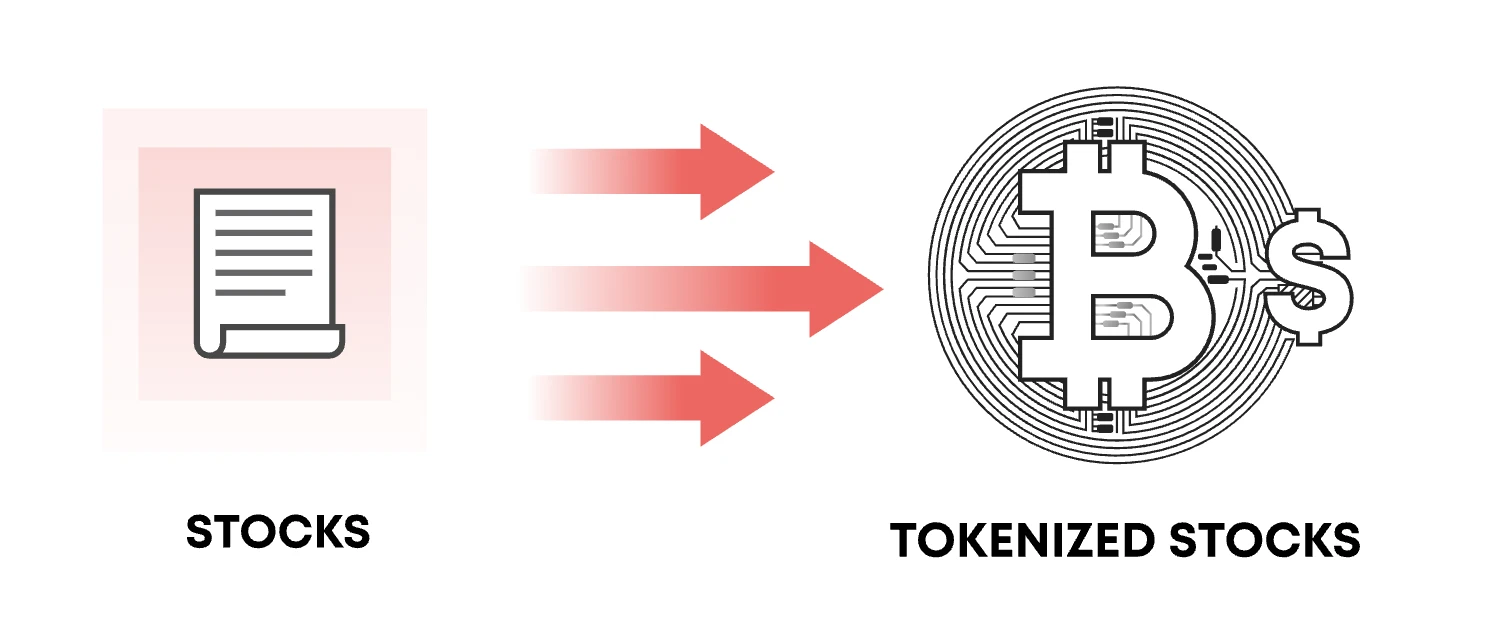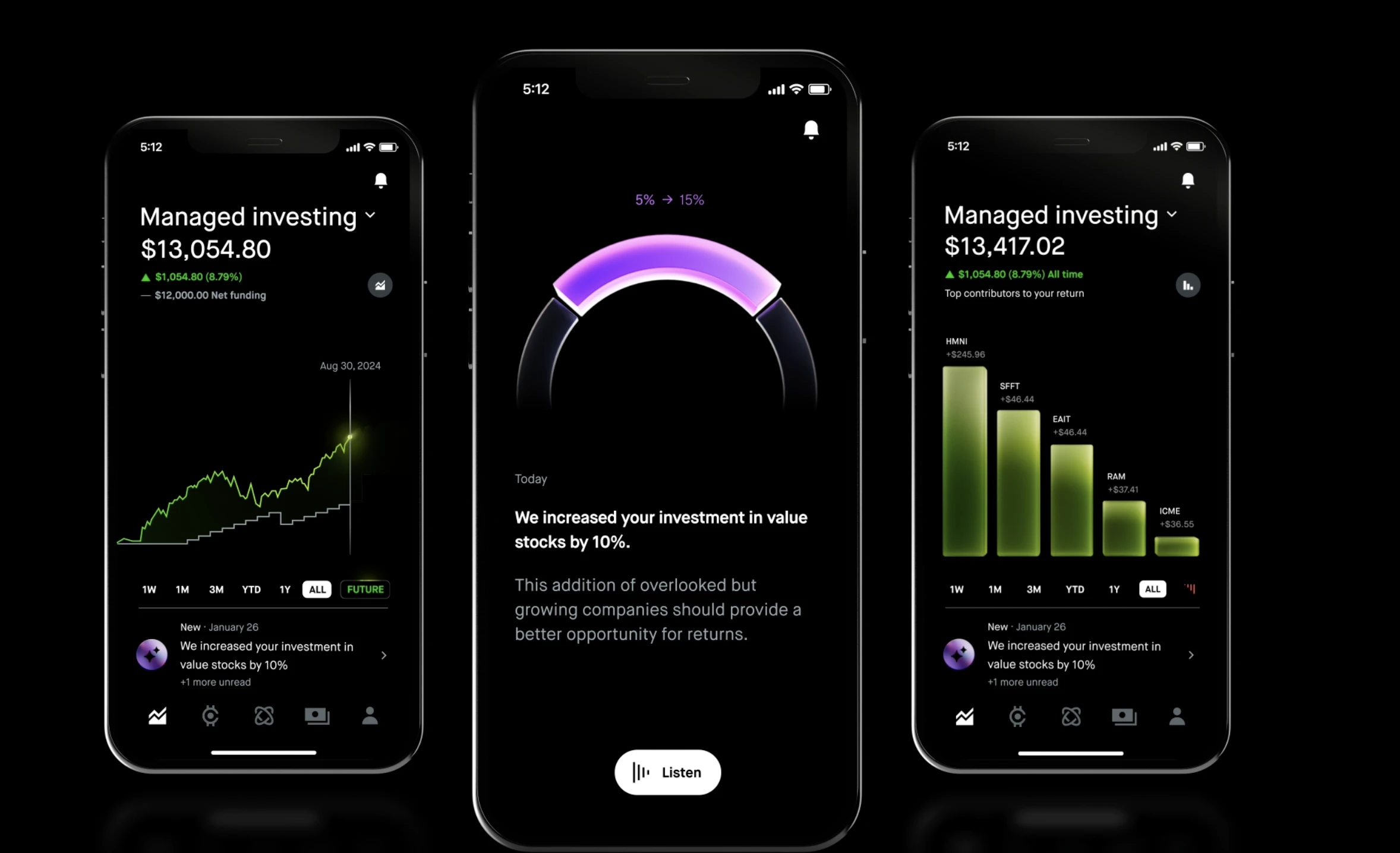On June 30, 2025, Robinhood announced a disruptive move at the To Catch a टोकन event in Cannes, France: launching tokenized trading services for more than 200 US stocks and ETFs for EU users, and for the first time including private equity in unlisted companies such as OpenAI and SpaceX in the tokenization category. This news was like a bombshell, quickly pushing Robinhoods stock price up nearly 13%, setting a record high, and also ignited heated discussions on stock tokenization in the global financial market.

As a platform that subverts traditional brokerages with zero-commission transactions, Robinhood has further broken down financial barriers through blockchain technology, deeply integrating the potential of the traditional stock market with decentralized finance (DeFi). This not only marks a new round of collision between traditional finance (TradFi) and blockchain technology, but also outlines a future picture of financial democratization for global investors.
Stock Tokenization: The New Blockchain for Traditional Finance
Stock tokenization is the process of converting traditional stocks or equity into digital tokens on the blockchain, each of which represents a certain percentage of the underlying asset ownership. These tokens are issued and traded on the blockchain through smart contracts, retaining the economic attributes of stocks, such as price fluctuations and dividend income, but usually do not include shareholder voting rights.

Compared with the traditional stock market, tokenization uses the distributed ledger technology of blockchain to achieve transparency and immutability of transactions, while significantly reducing intermediary costs and settlement time. Robinhoods tokenization service is based on Ethereums second-layer network Arbitrum, and plans to migrate to its own blockchain platform in late 2025 or early 2026. This technology choice not only reduces transaction fees, but also allows global investors to participate in the US stock market more conveniently through decentralized features. Robinhoods attempt is not an isolated incident. Globally, stock tokenization is becoming a pioneer in the integration of traditional finance and blockchain, attracting widespread attention from क्रिप्टो exchanges to traditional financial institutions.
Robinhoods service covers US market giants such as Apple, Microsoft, and Nvidia, and boldly attempts to tokenize the equity of unlisted companies such as OpenAI and SpaceX. This innovation is particularly eye-catching in the EU market, because the EUs relatively relaxed regulatory environment allows non-qualified investors to participate in private equity transactions, while the US market is temporarily unable to achieve similar functions due to strict qualified investor regulations. However, OpenAI publicly stated that it did not cooperate with Robinhood and did not approve of its tokenization behavior, highlighting the legal and compliance complexity of private equity tokenization. Despite this, Robinhoods move is still seen as a milestone in the transformation of traditional finance to blockchain, indicating that stock tokenization may become a new generation of financial instruments after ETFs.
How tokenization can reshape the investment experience
The core appeal of stock tokenization lies in its revolutionary change to the investment experience. First, tokenization breaks the investment threshold of the traditional stock market. By splitting stocks into small tokens, ordinary investors can participate in the investment of high-value assets at a lower cost. For example, the price of a single share of SpaceX may be as high as thousands of dollars, far beyond the budget of ordinary investors, but tokenization allows investors to purchase its partial ownership, which greatly improves the inclusiveness of the market. This fractional ownership model is particularly suitable for young investors and users in emerging markets. Robinhoods EU users can now invest in US stocks and unlisted companies at a very low cost through its platform.
In addition, tokenization significantly improves trading efficiency. Traditional stock market transactions usually require multiple intermediaries such as brokers, exchanges, and clearing agencies, and the settlement time is as long as T+2 (two days after the trading day). The instant settlement feature of blockchain shortens the transaction time to almost real time, and Robinhoods zero-fee model further reduces investment costs. This efficiency not only attracts retail investors, but also provides institutional investors with more flexible trading options. More importantly, tokenized stocks support 24/7 trading, breaking the fixed time restrictions of the traditional stock market. Robinhood currently provides 24/5 trading services and plans to achieve 24/7 trading in the future, which is a major breakthrough for global investment needs.

The transparency and security of blockchain also add unique advantages to tokenization. Distributed ledger technology ensures that every transaction is publicly traceable, reducing the risk of fraud, while the automated execution of smart contracts reduces human intervention and further improves the reliability of transactions. Robinhood implements tokenized transactions through the Arbitrum network, which not only ensures technical stability, but also provides users with the convenient experience of direct dividend payments. This transparent and efficient trading model is reshaping investors trust in and participation in the financial market.
Challenges of Tokenization
Despite the bright prospects for stock tokenization, its development path is not smooth. First, regulatory uncertainty is the biggest obstacle. Tokenized stocks are considered securities and must comply with the financial regulations of various countries. The EUs MiCA (बाज़ार for Crypto Assets Regulation) provides a compliance basis for Robinhoods tokenization services, but the US market has not yet been fully opened due to strict supervision by the SEC. OpenAIs opposition to Robinhoods tokenization further exposes the legal gray area of private equity tokenization. Unauthorized tokenization may lead to legal disputes and even invalidate assets. In the future, tokenization platforms will need to find a balance between regulatory compliance and innovation, which may increase operating costs and slow down market expansion.
Technical risk is another major challenge. The security and stability of the blockchain system directly affect the reliability of tokenized assets. Historical hacker attacks and smart contract vulnerabilities remind us that technical failures can lead to significant losses. Robinhood chose Arbitrum as its initial issuance network, and will face the complexity of technical integration in the future when migrating to its own blockchain. In addition, the openness of the blockchain conflicts with the privacy protection needs of the financial market. How to protect user privacy while ensuring transaction transparency is a difficult problem that tokenization platforms must solve.

Market acceptance is also a challenge that cannot be ignored. Although tokenized stocks have attracted a lot of attention, the unfamiliarity and distrust of blockchain technology among many traditional investors may hinder its popularity. Tokenized stocks generally do not provide shareholder voting rights, which may reduce their appeal to institutional investors who focus on corporate governance. In addition, the inertia of traditional financial markets makes many investors prefer familiar brokers and exchanges, and tokenization will take time to build broad market trust.
The future of stock tokenization
The potential of stock tokenization goes far beyond current attempts. According to industry forecasts, by 2030, the market size of real-world asset (RWA) tokenization may reach $16 trillion, of which stock tokenization will be an important part. Robinhood CEO Vlad Tenev once said that tokenization will start a huge trading revolution and make financial assets more accessible through blockchain technology. This vision is gradually being realized around the world. The Hong Kong Securities Regulatory Commission has issued मार्गदर्शकlines to support the tokenization of investment products, and the Taiwan Stock अदला-बदली has also established an RWA tokenization group to explore the application of blockchain in stocks and bonds. These policy signals indicate that tokenized stocks will gain legitimacy in more markets.
Industry competition and cooperation have further accelerated the development of tokenization. Coinbase is seeking SEC approval to launch tokenized stock services in the United States, Kraken launched the xStocks platform through the Solana blockchain, and traditional financial institutions such as JPMorgan Chase and Societe Generale are also experimenting with tokenized assets on their own blockchains. These efforts have not only promoted technical standardization, but also promoted the coordinated development of the blockchain ecosystem. For example, Robinhood鈥檚 cooperation with Arbitrum demonstrates the potential of cross-chain technology, and multi-chain integration and interoperability in the future may further enhance the flexibility and coverage of tokenized stocks.
Robinhoods strategic vision is particularly eye-catching. In addition to tokenized stocks, it has also launched cryptocurrency perpetual futures and staking services for Ethereum and Solana, trying to create a comprehensive investment platform covering traditional finance and crypto assets. Through the $200 million acquisition of Bitstamp, Robinhood has further enhanced its crypto trading capabilities. The Layer-2 blockchain it is developing will support the tokenization of more real-world assets, covering international stocks, private equity and even bonds. This all-round layout gives Robinhood a first-mover advantage in the tokenization wave.
Robinhoods stock tokenization service marks a new starting point for the integration of traditional finance and blockchain technology. By tokenizing US stocks and unlisted company equity, Robinhood provides EU investors with a low-cost, efficient investment channel, while setting a benchmark for the digital transformation of global financial markets. Although challenges in regulation, technology and market acceptance still exist, tokenized stocks are becoming the new favorite of the capital market with their advantages such as high liquidity, 24-hour trading and transparency.
Looking ahead, as blockchain technology matures and the regulatory framework improves, stock tokenization is expected to break the barriers of traditional finance and provide more fair and transparent investment opportunities for global investors. Robinhoods pioneering role and its deep cooperation with the blockchain ecosystem have injected strong momentum into this trend. However, OpenAIs opposition reminds us that the challenges of tokenization in compliance and legality cannot be ignored. In the future, Robinhood and other players in the industry need to find a balance between innovation and compliance to achieve long-term sustainable development of tokenization.
The wave of stock tokenization has arrived, and Robinhoods attempt is just the beginning. At the intersection of blockchain and traditional finance, a more open and efficient capital market is taking shape. How will tokenization reshape the global financial landscape in the next decade? The answer may have already emerged in Robinhoods blockchain blueprint.
This article is sourced from the internet: Can stock tokenization become the next grand narrative?
1. Popular currencies on CEX CEX top 10 trading volume and 24-hour rise and fall: BTC: +3.82% ETH: +8.11% SOL: +5.42% XRP: +2.57% PEPE: +8.97% HUMA: -6.54% DOGE: +6.36% SUI: +5.85% TRX: +1.84% BNB: +2.29% 24 H increase list (data source: OKX): BORA: +34.55% RVN: +31.01% KAIA: +24.4% UMA: +19.57% ANIME: +18.92% KDA: +18.32% LQTY: +17.1% WIF: +15.09% DEGEN: +14.86% GOG: +14.81% 2. 24-hour hot search currencies Skate (SKATE): A new project on Binance Alpha. Skate is an infrastructure layer that enables users to seamlessly interact with protogenesis chains by connecting them to all virtual machines (EVM, TonVM, SolanaVM). Verse World (VERSE): Moonshot announced the launch of the Metaverse project last night. Its market value exceeded US$1 billion last night and was temporarily reported at US$546 million. Headlines US President…







